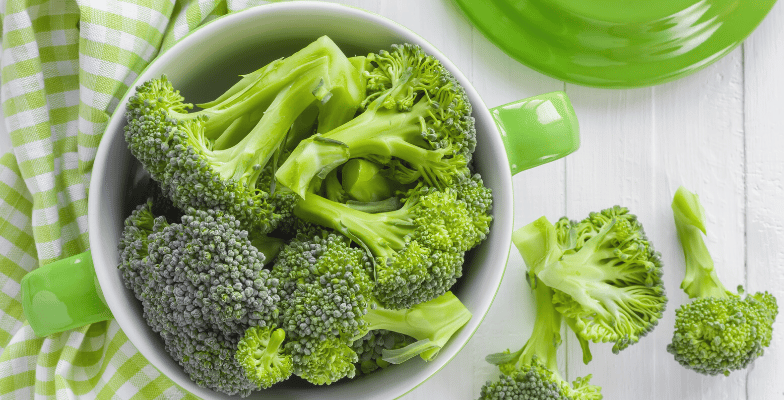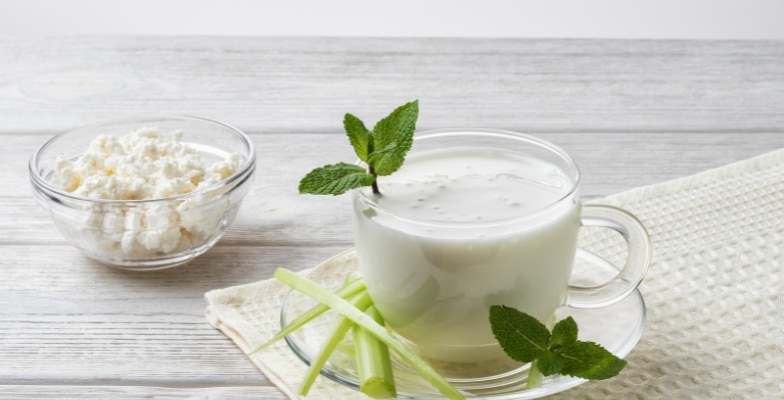Health Benefits And Nutritional Value Of Broccoli
- What Is Broccoli Good For?
- Health Benefits Of Broccoli
- How To Eat Broccoli
- Broccoli Vs. Cauliflower
- Safety Concerns
- Conclusion

Broccoli is an edible green plant botanically known as Brassica oleracea italica. It is a part of the cruciferous vegetable family, including kale, cauliflower, brussels sprouts, bok choy, cabbage, collard greens, and turnips.
Broccoli originated in Italy, where it was cultivated from wild cabbage. The Italian name for broccoli is broccolo, meaning flowering on top of a cabbage.
What Is Broccoli Good For?
Broccoli is probably one of the first plant-based foods that come to mind when you think about healthy eating. But people either love it or hate it. Here are a few things broccoli is good for:
High Fiber
Fiber is the indigestible part of carbohydrates that may help reduce cholesterol, promote good bowel health, regulate blood sugar, and assist in weight loss. Fiber-rich foods help us feel full longer after eating. The 2-3 grams of fiber in a cup of raw broccoli supports a robust digestive system and feeds beneficial bacteria in the gut, boosting immunity.
The same quantity of broccoli also contains over 80 ml (3oz) of water. 1https://www.stmichaelshospital.com/pdf/programs/hemodialysis/fluid-content-of-foods.pdf The fiber and water combination boosts feelings of fullness and supports healthy weight management. And the fiber also helps keep blood sugar and insulin-regulated for steady energy. 2https://pubmed.ncbi.nlm.nih.gov/29378044/
Related Article: What Is Fiber? Health Benefits, Food Sources And Daily Requirements
Low Glycemic Index
About one cup of raw, chopped broccoli contains only 31 calories, 6 grams of carbohydrates, and 1.5 g of sugar. The glycemic index (GI) for broccoli is 15- 20. The glycemic index is a general estimate of how food affects blood sugar levels. Broccoli is a low-GI food, which means it has a minimal effect on blood sugar levels. 3https://www.nhrmc.org/~/media/testupload/files/low-gylcemic-meal-planning.pdf?la=en
Related Article: What Is Glycemic Index | Food List With Glycemic Index
Rich In Vitamins And Minerals
Broccoli is bursting with vitamins and minerals.
Vitamin C
It is an excellent source of immune-boosting vitamin C, providing over 81 mg per cup, or about 135% of your daily needs. Vitamin C is an antioxidant essential for immune function and skin health.
Vitamin K1
Broccoli contains a high amount of vitamin K1, which is vital for blood clotting and may promote bone health. One cup of broccoli provides 116% of your daily recommended intake.
Vitamin B9 (folate)
It is needed for healthy tissue growth and cell function and is very important for pregnant women.
Potassium
Potassium is an essential mineral beneficial for keeping blood pressure in control and preventing heart diseases.
Manganese
Manganese is a trace element found in high amounts in whole grains, legumes, fruits, and vegetables, including broccoli.
Iron
Iron is an essential mineral that performs many crucial functions in our body, such as oxygen transport in red blood cells.
Packed With Antioxidants And Plant Compounds
Broccoli is also packed with antioxidants and phytochemicals responsible for the color, smell, and flavor of most fruits and vegetables.
Related Article: Phytonutrients Definition | Phytonutrients Foods And Chart
Sulforaphane
Sulforaphane is a naturally occurring, abundant, and extensively studied compound in cruciferous vegetables like broccoli, cabbage, and kale. It’s activated when vegetables are chopped or chewed and is more available in raw broccoli than cooked. Sulforaphane is linked with various health benefits and may protect against cancer, heart disease, and diabetes. 4https://pubmed.ncbi.nlm.nih.gov/19519500/
Carotenoids
Broccoli contains lutein, zeaxanthin, and beta-carotene, which all contribute to eye health.
Kaempferol
An antioxidant with many health benefits, this compound may protect against heart disease, cancer, inflammation, and allergies.
Quercetin
This antioxidant has numerous benefits, including lowering blood pressure in people with hypertension. 5https://www.ncbi.nlm.nih.gov/pmc/articles/PMC4103733
Health Benefits Of Broccoli
May Reduce The Risk Of Cancer
No food or superfood can prevent cancer, but there is evidence that eating a healthy diet can reduce the risk. Antioxidants can help find and counterbalance free radicals that cause cell damage. According to the National Cancer Institute, free radicals are unstable byproducts of metabolism that may lead to cancer. 6https://www.cancer.gov/about-cancer/causes-prevention/risk/diet/cruciferous-vegetables-fact-sheet#r2
Sulforaphane, a sulfur-containing compound and Indole-3-carbinol are antioxidants readily available in broccoli. Research suggests these compounds may have powerful antitumor properties. 7https://www.ncbi.nlm.nih.gov/pmc/articles/PMC5989150/, 8https://www.ncbi.nlm.nih.gov/pmc/articles/PMC2814317/
Dr. Emily Ho of The Linus Pauling Institute at Oregon State University suggests that with more studies, sulforaphane and other dietary compounds may be added to traditional cancer therapy. These compounds might either prevent cancer, slow its progression, treat it, or stop its recurrence. 9https://lpi.oregonstate.edu/feature-story/early-stage-breast-cancer-slowed
Many other studies have hinted that the bioactive components in cruciferous vegetables like broccoli, cauliflower, and kale may have beneficial effects on biomarkers of breast cancer, prostate cancer, gastric cancer, colorectal cancer, and bladder cancer. 10https://pubmed.ncbi.nlm.nih.gov/22877795/, 11https://pubmed.ncbi.nlm.nih.gov/22121852/, 12https://pubmed.ncbi.nlm.nih.gov/23679348/, 13https://pubmed.ncbi.nlm.nih.gov/23211939/, 14https://pubmed.ncbi.nlm.nih.gov/22391648/
May Protect The Heart
Heart disease is a leading cause of death in both men and women globally. Based on the available evidence, the optimal dietary pattern to reduce CVD suggests consuming whole grains, fruits and vegetables, legumes, nuts, fish, poultry, and moderate amounts of dairy and heart-healthy vegetable oil. This kind of diet may reduce CVD risk by about a third. 15https://www.ncbi.nlm.nih.gov/pmc/articles/PMC4597475/
Cruciferous vegetables, including broccoli, may protect the heart by reducing arterial damage that leads to the hardening of the arteries, often a precursor to heart attack and heart disease. 16https://www.sciencedirect.com/science/article/abs/pii/S027153170800064X?via%3Dihub https://pubmed.ncbi.nlm.nih.gov/21593509/
A 2018 population study suggested that older women whose diets were rich in cruciferous vegetables had a lower risk of atherosclerosis, a disease in which plaque builds up inside arteries and can result in a heart attack. This benefit may be due to the antioxidant properties of sulforaphane in cruciferous vegetables. 17https://www.ahajournals.org/doi/10.1161/JAHA.117.008391
One 2017 study suggested that people who consume more dietary fiber may have a lower risk of CVD. Broccoli is a good source of fiber, antioxidants, and potassium; all of these may help prevent CVD. 18https://www.ncbi.nlm.nih.gov/pmc/articles/PMC5731843/ A study by Nutrition Research linked regular consumption of steamed broccoli with lower cardiovascular disease risk due to reduced total cholesterol levels. 19https://www.sciencedirect.com/science/article/abs/pii/S027153170800064X?via%3Dihub
May Improve Total Health
Studies suggest that eating broccoli may lower blood sugar and improve diabetic control, which may be due to broccoli’s low glycemic index, and antioxidant and fiber content. 20https://www.sciencedaily.com/releases/2008/08/080825210332.htm
Some of the nutrients and bioactive compounds like kaempferol and sulforaphane in broccoli may support healthy brain tissue and nervous system function. 21https://www.ncbi.nlm.nih.gov/pmc/articles/PMC4103733/
An article in Reuters suggested tender baby broccoli plants, known as broccoli sprouts, are an increasingly popular health food as their extracts have shown promise in treating or preventing a common stomach bug linked to gastritis, ulcers and even stomach cancer. 22https://uk.reuters.com/article/us-bacteria-brocolli/baby-broccoli-may-help-prevent-stomach-cancer-study-idUKTRE5351BT20090406
How To Eat Broccoli
First, try to procure broccoli from a farmers market, and select broccoli with closely packed, firm, dark green florets. Avoid sloppy broccoli pieces turning yellow or wilting. Some people prefer to eat only broccoli florets, but the leaves and stems are also edible.
The stalk contains the most fiber, while broccoli leaves are the highest in cell-protecting antioxidants, vitamins E and K, and calcium.
Do not wash broccoli until you’re ready to prepare it, as wet broccoli can develop mold and become limp. Unwashed, it will stay fresh for at least a week in the fridge, wrapped in loose paper.
Boiling broccoli florets for 5 minutes can lead to a 20- 30% loss of nutrients, and boiling for 10 minutes results in a 40- 50% loss, so avoid boiling it. 23https://warwick.ac.uk/newsandevents/pressreleases/research_says_boiling https://www.ncbi.nlm.nih.gov/pmc/articles/PMC2722699/ There are many ways to eat broccoli.
Raw
One of the many ways to enjoy broccoli is raw, dipped in hummus, seasoned tahini, or guacamole. It can also be finely chopped or shredded and added to salads or slaw. It can blend raw or frozen into smoothies as well.
Steamed
One should steam it to retain the most nutrients, then drizzle it with extra virgin olive, coconut oil-based pesto, or a savory walnut butter sauce.
Roasted Or Sautéed
Lightly sauté broccoli and add it to many dishes, including stir-fries, soups, stews, and more.
Made Into A Sauce
Broccoli can be finely chopped or pureed to make homemade pesto, jus or dressing. Incorporating more of this wonder vegetable into your diet is a smart way to upgrade your nutrient intake.
Broccoli Vs. Cauliflower
Broccoli and cauliflower belong to the same Brassica species and have several similarities in nutritional content and probable health advantages. They have a few differences and offer varying amounts of specific vitamins, minerals, and antioxidants.
However, both vegetables bring a valuable and nutritious addition to a healthy, well-rounded diet.
Similarities
Broccoli and cauliflower have almost the same carbohydrate amounts and are both low in calories and high in fiber, making them first-class choices for weight loss and better digestion. Both have folate, fiber, and potassium, plant compounds that help with cancer prevention, weight loss, lower cholesterol levels, and gut health.
Differences
While they are both nutritious vegetables, broccoli has a higher vitamin K and C content than cauliflower. Broccoli is specifically known to be good for eye health. Broccoli also provides more minerals and fiber and contains vitamin A, which isn’t in cauliflower.
Broccoflower
Broccoflower, or green cauliflower, is a new vegetable resulting from cross-pollination between cauliflower and broccoli. There are a few broccoflower types. The most common type looks like white cauliflower but is lime green with spiked florets.
Broccoflower boasts similar nutritional qualities to cauliflower and broccoli while having more vitamin C than oranges and more vitamin A than broccoli. 24https://cals.arizona.edu/fps/sites/cals.arizona.edu.fps/files/cotw/Broccoflower.pdf
Related Article: Cauliflower Nutrition Facts | What Is Cauliflower Good For?
Safety Concerns
Generally, there are no side effects of consuming broccoli for hypothyroid patients. One would have to consume an excessive and unrealistic amount of cruciferous vegetables to interfere with iodine hormone production in the thyroid. However, it is always better to consult your doctor before binging on it.
Many vegetables contain traces of pesticides, but broccoli appears on the Environmental Working Group’s 2020 list of 15 “clean” vegetables, which means the risk of contamination is low. Nevertheless, we should wash all vegetables well. 25https://www.ewg.org/foodnews/summary.php
Conclusion
I think the best tip to stay healthy and happy is to eat a well-balanced diet, engage in moderate physical activity, and enjoy each day with gratitude. Broccoli is one of the most nutritious vegetables, and when cooked properly, it can be a delicious and economical addition to any well-balanced diet.
What do you think of this article? Have any questions? Let me know in the comments below!

Skill-Based Education.
Global Recognition.
Powerful Community Building
Secure a certificate of completion in as little as a day by graduating from one of our free courses.
Get Access to Our Free Courses. No Credit Card Required.

Fabulous Body Membership
Your All-Access Pass to A Fabulous Body & A Rewarding Career
25+ Certificate Courses & Programs, All Included
15 Day Free Trial, 100% Money-Back Guarantee
About Kamini Thakar
Kamini is a very skilled writer/content creator. As a part of Fabulous Body for years, she has authored many articles really proving her prowess in acquiring and presenting knowledge about various health & nutrition topics.










